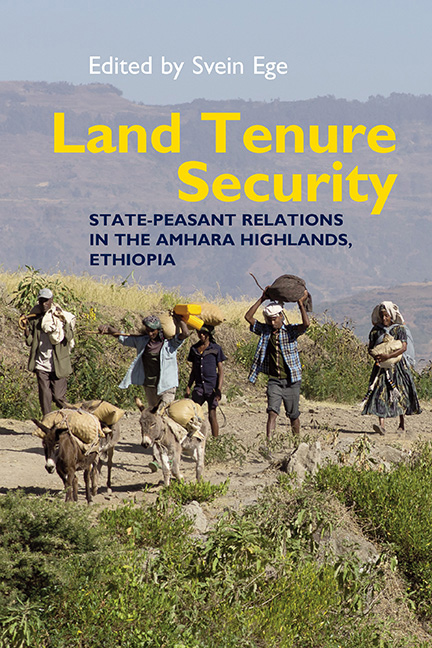Book contents
- Frontmatter
- Dedication
- Contents
- List of Illustrations
- Note on Transliteration
- Dates and Measures
- Contributors
- Preface
- Glossary
- Map
- 1 Introduction
- 2 Peasant Land Tenure: A Critical Review
- 3 The Dersha System: Rethinking Land Tenure under the Därg
- 4 Land Tenure in Gojam under the Därg
- 5 Land Tenure in Baba Säat, North Wälo
- 6 Rich and Poor: Land and Wealth in Mäqét, North Wälo
- 7 Rural Land and Urban Aspirations: Future Orientation in a Time of Change
- 8 An Unstable Land Tenure System
- 9 Conclusion
- Postface
- Select Bibliography
- Index
- Eastern African Studies
8 - An Unstable Land Tenure System
Published online by Cambridge University Press: 26 March 2019
- Frontmatter
- Dedication
- Contents
- List of Illustrations
- Note on Transliteration
- Dates and Measures
- Contributors
- Preface
- Glossary
- Map
- 1 Introduction
- 2 Peasant Land Tenure: A Critical Review
- 3 The Dersha System: Rethinking Land Tenure under the Därg
- 4 Land Tenure in Gojam under the Därg
- 5 Land Tenure in Baba Säat, North Wälo
- 6 Rich and Poor: Land and Wealth in Mäqét, North Wälo
- 7 Rural Land and Urban Aspirations: Future Orientation in a Time of Change
- 8 An Unstable Land Tenure System
- 9 Conclusion
- Postface
- Select Bibliography
- Index
- Eastern African Studies
Summary
THE LAND ISSUE IN THE CURRENT CONTEXT
For decades, Ethiopia was associated with famine. In recent years, it has become associated with spectacular economic growth. The GDP figures are impressive, but of even more importance is the growth in the agricultural sector and notably in food production. The changes outlined by Aspen in Chapter 7, in what used to be the famine-struck rural backwaters of highland North Wälo (cf. McCann 1987a), are indicative of the growth and, increasingly, the transformation of the Ethiopian economy.
This astounding success must necessarily affect the way we frame the discussion about Ethiopian land tenure policy. It could be argued that this contentious issue has now finally been laid to rest: the current land tenure system is no hindrance to economic growth and welfare; indeed, it may be the guarantor for growth with equity. In this chapter, I shall argue the opposite.
When I first visited Ethiopia, in 1981, I presented my plans for a study of land tenure to a senior Ethiopian professor in the social sciences. His reaction was that land tenure was not of interest any more. It had been settled by the land reform of 1975 once and for all. It should be pointed out that although I did not agree, this view looked much more sensible in 1981 than it does now with the benefit of hindsight. The government also considers the land question to be settled, and after the certification programmes of the early 2000s, many observers seem to agree. My view, however, is that there are built-in contradictions in the system of state land ownership, and it is therefore unsustainable in the longer run, or if it is sustained for political reasons, there will be significant social costs.
As social scientists we are used to criticizing, yet often without presenting the underlying alternative that is implicit in the criticism. Is the alternative more viable or less problematic than what is criticized? In this chapter, I take a more positive stance by outlining the basis for an alternative policy. This is challenging, as any land tenure policy in Ethiopia is likely to lead to specific problems. Writing this chapter is therefore a matter of honesty, making clear my thinking and thus exposing it to criticism. Being a historian, I set the argument within a long-term view of Ethiopian development and land tenure history.
- Type
- Chapter
- Information
- Land Tenure SecurityState-peasant relations in the Amhara Highlands, Ethiopia, pp. 131 - 152Publisher: Boydell & BrewerPrint publication year: 2019
- 1
- Cited by



